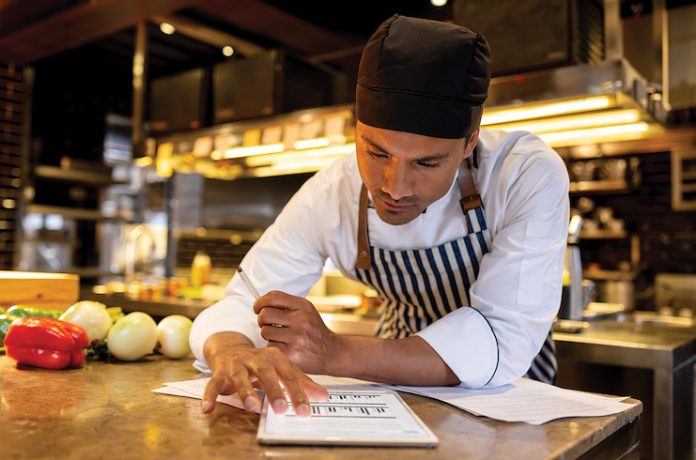When hoteliers aim to enhance sustainability, energy and water conservation typically come to mind first, as those are the most well-trodden paths to both operational savings and environmental stewardship. But food waste reduction brings those same benefits and has become much easier to achieve in a systematic way thanks to specialized tech tools from companies such as Beaverton, Oregon-based Leanpath and Utrecht, The Netherlands-based Orbisk. The development of these products is a major advancement toward ultimately reducing food waste’s impact on the environment, which can be underestimated.
“If food waste was a country, it would be the third-largest producer of greenhouse gas emissions behind the United States and China,” said Jon Garrett, vice president of business development, Leanpath. “It is really a key part of the sustainability story and one of the key methane producers that’s driving greenhouse gas challenges.” Jeroen Feron, growth marketer, Orbisk, added, “There’s so much CO2 being used to create, for example, a kilogram of beef, and thousands of liters of water are used to actually feed the cow that is being used to create beef. That’s not something you typically think of when you throw away food.” And while many hoteliers “believe they’re doing the right thing by, for example, composting or turning the waste into biofuel, the best solution is to prevent food waste, which saves time and money,” Feron stressed. “I think that [prevention] mindset still needs to be more present.”
“If food waste was a country, it would be the third-largest producer of greenhouse gas emissions behind the United States and China.” – Jon Garrett Vice President of Business Development, Leanpath
Progress has been made in raising awareness, however. “It’s become much more of a focus for hotel customers recently,” said Garrett. “I think that the recognition of food waste prevention, being part of the broader sustainability story, has changed quite a bit and a lot of progress has been made in understanding the implications and impacts. We’re actually seeing significantly more awareness by executive chefs and food and beverage directors.”
Among the biggest sources of food waste in the hotel industry are buffets and banquets, where it is difficult to predict the ideal amounts of food and over-buying or overproduction often results. “Statistics have shown that the average kitchen wastes 4 percent to 10 percent of what is purchased,” said Garrett. “By putting in Leanpath, we typically cut 50 percent of that waste.”
The Convenience of Specialized Technology
A hotel kitchen team may attempt to track food waste manually, by weighing and then recording amounts and types of waste in an Excel file, for instance. But the time commitment would be considerable. “Rarely do the folks in hotel kitchens have the time to spend on analytics and on computers. So, moving to a technology platform gives you an easier way to track it,” Garrett pointed out. “And it’s much more cost effective to invest in a technology solution than to dedicate significant staff time; we know that the cost of labor continues to increase.”
Staff simply use the system’s hardware components to weigh and photograph the waste, which takes seconds, and the time-stamped data is fed into the platform. In the case of Leanpath, it’s a cloud-based platform called Leanpath Online that shows trends and actionable data points in the client’s food waste. “When we get you on board with us, you build a dashboard, which will show you key metrics for last week, last year, etc.,” Garrett explained. “It can also show if there were certain dates or events that led to more challenges or problems.” Leanpath’s Impact Suite brings even more functionality, including Goals, which identifies a kitchen’s top food waste opportunities based on cost, frequency, etc., and then creates action plans to address that waste. The Impact Suite also includes Alerts, which notifies chefs and managers in real time when their Goal items are being wasted, or when other high-priority waste items have been recorded with Leanpath Trackers.
Food waste tracking systems can also categorize waste in multiple ways, such as storage waste, plate waste, breakfast food, dinner food, specific ingredients, specific dishes, etc. The latter can inform menu changes. “If you have choices and items that are not as well consumed, that can really paint a really clear picture for menu changes that you should make,” Garrett noted.
Coaching Services
Both Leanpath and Orbisk go beyond hardware and software products and consult with clients on how to improve in this area. “Our teams help ensure customers understand the data and drive suggestions on improving tracking efficiency and success,” said Garrett. “We do not just place tech in a kitchen and send you on your way; we actually help guide you along the way. For example, we ask questions about why [a particular item] is wasted. Because there is a reason that we think is a critically important piece to driving successful results.” According to Feron, “It’s not only AI and automation; it’s also people helping you interpret data. Our Food Waste Coaches [suggest] actions that you can do, like menu and kitchen process optimizations.” Onsite coaching can include everything from feedback on kitchen layouts to make dispensation easier, to training on knife skills that minimize waste.
The Future of Food Waste Reduction
Embarking on a food waste reduction program—especially one that is assisted by a product such as Leanpath or Orbisk—is among the least complicated sustainability initiatives. “Not throwing away food is the ‘low-hanging fruit’” of environmental stewardship, as Feron put it. With more hoteliers realizing this opportunity, the hope is that food waste reduction “becomes a standard part of doing business” in hospitality and other industries—and specifically the more effective tech-enabled variety, Garrett said. “You’ll continue to see subtle tweaks and enhancements to make the technology easier to use. But the key difference that we envision in the future is that it will be part of doing business, just like safety and sanitation.”











